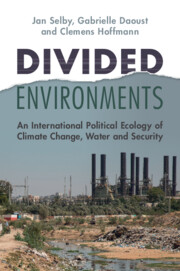6 - Frontiers
Published online by Cambridge University Press: 15 September 2022
Summary
This chapter is a companion to the previous one and extends many of its themes, but this time in relation to territorial frontiers. ‘Frontiers’, as understand here, are simultaneously geographically peripheral to existing centres of political and economic power, objects of outward expansion and colonisation, and home to both abundant resources and local populations who are routinely marginalised, excluded and sometimes expelled in the name of development. The chapter explores such frontier dynamics in relation to ‘water frontiers’ within Sudan, the Palestinian territories, the Lake Chad region and north-eastern Syria. It shows that frontiers are sites of extreme levels and forms of appropriation, inequality, degradation, conflict and insecurity, as well as resilience and resistance, both in general and in relation to water specifically. And the chapter closes, in line with previous ones, by turning to climate change, noting that frontiers are widely misunderstood within climate crisis discourse – and by reflecting on how they are actually likely to fare as the planet warms.
Keywords
- Type
- Chapter
- Information
- Divided EnvironmentsAn International Political Ecology of Climate Change, Water and Security, pp. 169 - 208Publisher: Cambridge University PressPrint publication year: 2022

